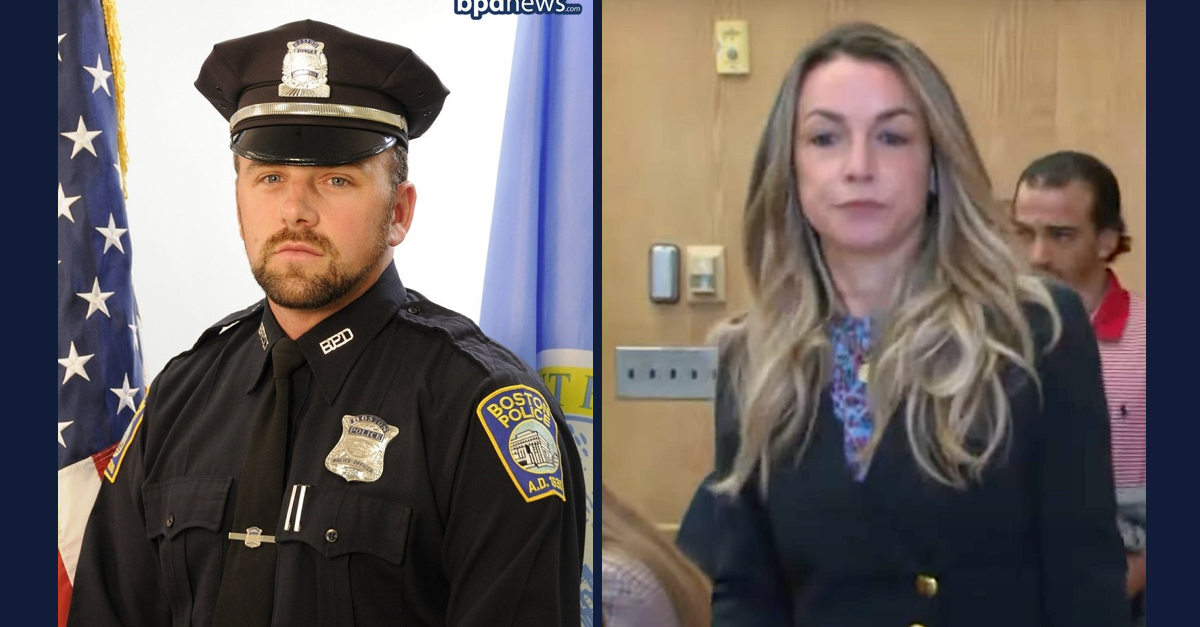
John O’Keefe and Karen Read. (Images via BPD portrait and WBZ-TV screengrab, respectively.)
A judge last week said the prosecutor in the Karen Read case used “poor judgment” in issuing a public statement defending his case but declined the defense request to remove the district attorney’s office from the trial.
Read is accused of killing her boyfriend, Boston police Officer John O’Keefe, with her SUV when she dropped him off at a fellow cop’s house in Canton, Massachusetts, early in the morning of Jan. 29, 2022, following a night of drinking. In the midst of a blizzard, Read left O’Keefe to die, prosecutors allege. He was found the next morning buried in snow and later pronounced dead. Her lawyers claim O’Keefe made it into the cop’s house that night where someone inside assaulted him and then dumped him outside in the snow to die which led to a vast conspiracy of law enforcement covering up the crime.
Read’s attorneys asked Superior Court Judge Beverly J. Cannone to throw Norfolk County District Attorney Michael Morrissey’s office off the case because of a video issued last August. In the video, Morrissey railed against the “harassment of witnesses” in the case. He said the people who were in the cop’s home that night were witnesses, not suspects as the defense contends.
“These people were not part of a conspiracy and certainly did not commit murder or any crime that night,” he said. “They have been forthcoming with authorities, provided statements, and have not engaged in any cover-up … To have them accused of murder is outrageous.”
The defense has also tried to connect personal relationships between the witnesses and police investigators, including lead Det. Michael Proctor of the Massachusetts State Police. Morrissey said Proctor had no close relationships to the witnesses and any “suggestion to the contrary is a lie.”
Read’s lawyers accused Morrissey of violating the Massachusetts Rules of Professional Conduct pertaining to pretrial publicity. The rules say, in part, that an attorney involved in a matter “shall not make an extrajudicial statement” about a case that would have a “substantial likelihood of materially prejudicing an adjudicative proceeding in the matter.” Specifically addressing prosecutors, the rules say they should “refrain” from making comments that could heighten “public condemnation of the accused.”
Morrissey made the statement days after Read’s attorney Alan Jackson went on ABC’s Nightline to point the finger at the witnesses in the case.
Cannone took issue with both lawyers’ comments in the media. She said Jackson’s statements about the witnesses possibly being murderers or involved in a conspiracy “are the type of extrajudicial statements that are more likely to have a prejudicial effect on the statement.” Meanwhile, Morrissey’s video statement also risks “heightening the public condemnation” of Read.
“The contentions of the defendant in this regard are nontrivial,” Cannone wrote in the 11-page ruling.
But Cannone ruled that a prosecutor should not be dismissed from a case unless the conduct is “egregious” and too severely affects the public interest of “bringing guilty persons to justice.” Still, some of Morrissey’s comments “crossed the line” and were in “poor judgment,” Cannone wrote.
Read’s defense also objected to the district attorney’s office disclosure that the U.S. Attorney’s Office in November 2022 had started its own investigation, possibly looking into law enforcement misconduct. The investigation prompted Morrissey’s office to send their federal counterparts a letter asking that they let them know if any exculpatory information was uncovered. Read’s attorneys accused the prosecutor of failing to notify them of the ongoing federal investigation for six months, violating evidence disclosure rules.
The defense asked the judge to dismiss the case or disqualify the district attorney’s office. However, Cannone also rejected the request, saying while prosecutors knew about the investigation, they did not know the exact nature of it nor whether any new evidence was uncovered.
Read’s trial is scheduled for April 16.
Have a tip we should know? [email protected]

